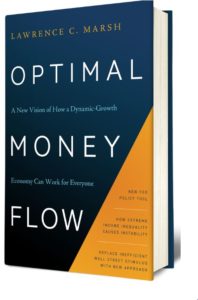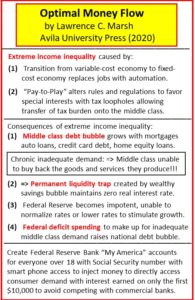
Conservatives will like the idea of allowing the people instead of the government to decide how to spend the money and that this approach does not increase taxes or add to the national debt while avoiding excessive inflation. It also uses less money and has a more direct and immediate impact on consumer demand than the purchase of US Treasury securities. Giving the money to Wall Street just boosts stock and bond prices with little impact on the real economy. Buying US Treasury securities requires too much money and takes too long to impact consumer demand, because the marginal propensity to consume of Wall Street bankers is much lower than that of Joe and Jane Sixpack, who are much more likely to spend additional money on new goods and services right away. Inflation can be kept under tight control by raising “My America” account interest rates as well as interest rates on US Treasury securities whenever necessary.
Marsh believes government can contribute to the efficiency of the free enterprise system by better aligning marginal costs and marginal benefits. Negative externalities such as excessive pollution require taxes as in carbon taxes or trading in carbon credits while positive externalities such as vaccinations for highly contagious diseases require subsidies to align marginal costs with marginal benefits. Government investments in infrastructure, education, national defense, health and basic research also promote and enhance efficiency, productivity, and economic growth by appropriately regulating natural monopolies and overcoming the free rider problem which inhibits the private provision of such core investments.
With higher levels of globalization, low levels of unionization, and more rapid technological change, a new type of business cycle has emerged—one in which rising middle-class debt and stock market bubbles have replaced price and wage inflation as the source of economic instability. Marsh introduces his innovative Money Flow paradigm, which sees government as the heart of the free enterprise system—and where it does and should play an active part in maintaining economic stability and ensuring efficient and equitable resource allocation in an economy. Previous economic paradigms viewed government as an external, alien force outside the system, but professor Marsh promotes a very different approach. While he acknowledges there is efficiency in the market for ordinary goods and services which converge toward equilibrium with negative feedback loops, he sees contagion effects and inefficiency in many financial markets with their positive feedback loops that contribute to irrational exuberance as prices rise or exacerbate downward spirals as prices fall.
Optimal Money Flow’s important message and unique proposals deliver a fresh view of the interconnectedness of the globe and an updated understanding of the underlying economic forces that shape our lives today—including international trade and how one country’s decisions now impact the rest of the world. From business travelers to university students, readers will rethink their basic assumptions about the nature of economics and the role of government.